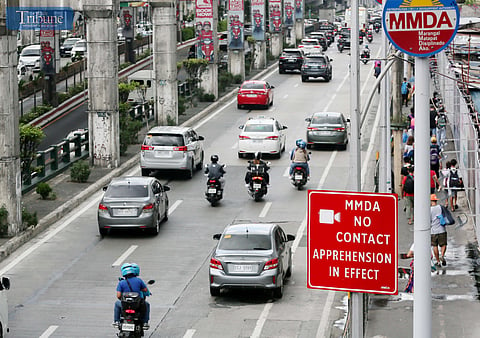
- NEWS
- the EDIT
- COMMENTARY
- BUSINESS
- LIFE
- SHOW
- ACTION
- GLOBAL GOALS
- SNAPS
- DYARYO TIRADA
- MORE

Metro Manila Development Authority Chairman Atty. Romando Artes confirmed on Monday the return of the No-Contact Apprehension Policy.
In an interview with DZRH, Artes explained that NCAP aims to prevent traffic violations and reduce the number of violators as much as possible.
"Tuloy na tuloy naman [ang NCAP]. Sa aming palagay, regadless kung may NCAP o wala, hindi ba dapat ang mindset ng ating mga kababayan ay hindi dapat ako magva-violate ng traffic rules?" he said.
(The NCAP’s return is certain. But in our view, regardless of whether NCAP is in place or not, shouldn’t our people have the mindset that they shouldn’t violate traffic rules in the first place?)
Artes pointed out that since the implementation of a temporary restraining order (TRO) against NCAP, traffic violations have significantly increased — from around 9,000 per month to over 40,000.
"Ang multa ng MMDA even before ng TRO ay napakababa," he said.
(Even before the TRO, MMDA’s fines were very low.)
He added that the agency is now addressing this issue through the Single Ticketing System, which ensures that penalties are clearly defined and reasonable.
"Depende kasi sa penalty, like Anti-Distracted Driving Act ang multa niyan ay nasa 5,000," he noted.
(It depends on the penalty. For example, under the Anti-Distracted Driving Act, the fine is ₱5,000.)
Artes emphasized that the purpose of penalties is to deter repeat offenses.
"Ang purpose ng penalty ay para hindi ka umulit kasi ang nagiging tendency kapag mababa ang penalty, may mga kababayan tayong iri-risk na lang iyan at kung mahuli ay magbabayad na lang kasi they can afford." he clarified.
(The goal of the penalty is to stop you from doing it again. Because what tends to happen when penalties are too low is that some people are willing to take the risk. If they get caught, they’ll just pay the fine—because they can afford it.)
He called on those opposing NCAP to simply obey traffic laws, as this would help improve the overall traffic system in the country.
